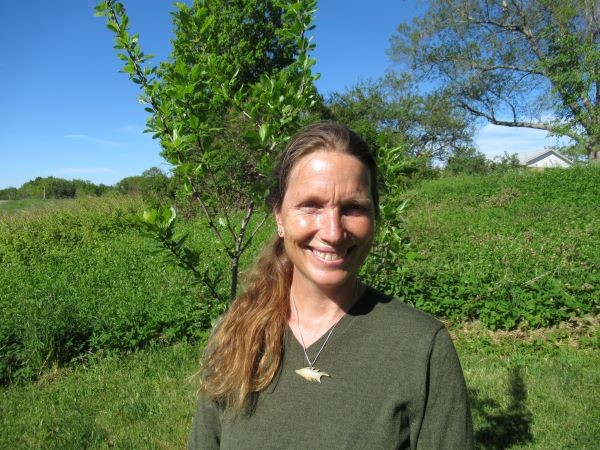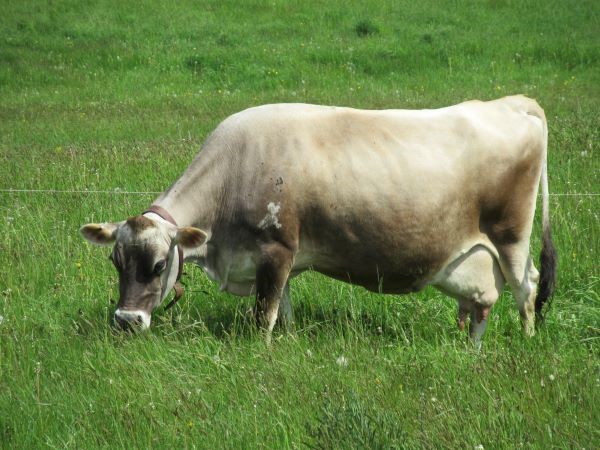 Laura Grady (Ed Robinson photo)
Laura Grady (Ed Robinson photo)
Two Coves Farm
By Ed Robinson, Board member of the Harpswell Heritage Land Trust in Maine
“I love the plants and the land, it is an organism to be fostered,” Laura Grady stated as she tried to explain her engagement with the 100 acres upon which Two Coves Farm rests. Laura continued “We listen to the land, we work with it by spreading compost and we try to determine the best use of each parcel.”
You need to spend only a few minutes in Laura’s company to know that her connection to the land runs very deep and that the farm business is her primary life’s work.
It is understandable that Laura enjoys working with the soil and animals since her father toiled on a small farm along with several other occupations to make ends meet, in typical Maine fashion. Growing up it was clear to Laura that her life would be lived outdoors since she is “not a four walls gal.” Her husband Joe grew up in a family with more professional backgrounds but in the mid 1990s Joe became interested in organic food, then more specifically in high nutrient foods. As the young couple thought about their lives, they focused upon how to feed their family with healthy food and decided that getting back to the land was more important to them than pursuing the material side of life.
Along with many other young adults in the late 90s, the Gradys moved back to the land trying to make a go of it on 40 acres. They found that they loved the life balance the farm offered them, but 40 acres was not large enough to support both vegetables and the cattle the Gradys wanted to manage. By good fortune, they were able to strike a long-term agricultural lease with the benevolent owner of their current home, and Two Coves Farm was born 11 years ago. Joe is also the Program Director at Wolfe’s Neck Center for Agriculture & the Environment in Freeport.
As you drive down Neil’s Point Road in Harpswell, you pass a fenced in parcel with 30 pigs whom Laura says enjoy living in the open forest rather than a concrete pen. Next you see a large enclosure for chickens, part of a total flock of 350 laying hens. Across the road from the 1885 farm house is a lovely 20-acre field running down to the ocean with a fenced section for 40 ewes, 3 rams and this year’s crop of 60 lambs. A lovely Jersey cow chews her cud in the fresh spring grass. The Gradys also maintain up to 25 Belted Galloway cattle on 40 leased acres in Brunswick.
Laura talks with obvious affection about the animals in her care, although they clearly are not pets. In her experience, respecting the animals, caring for them and giving them a healthy environment is enough to ensure the animals prosper and provide healthy food products when it is time for harvest. The animals and the fields of vegetables provide produce for the Gradys’ CSA (Community Supported Agriculture) operation. The farm sells to local restaurants and shops, and currently has more than 200 CSA members. The waiting list has grown during the pandemic as people look for healthy sources of food near their homes. Laura estimated that more than 80 percent of the food she sells remains within 30 miles of the farm.
The Gradys are respectful of other wildlife that live on and around their farm, including the many birds and predator species. While they have not had problems with bald eagles, hawks sometimes decide to go for a tasty chicken dinner. Laura remembers a fisher that managed to kill five chickens, but the local foxes do not seem to cause trouble. She also recalled an incident where she fell asleep in the woods while leaning back on a tree. She awoke to find two weasels jumping over her legs but causing no harm. Laura is appreciative of neighborhood coyotes since they keep the population of mice and shrews in check, thereby lowering tick numbers. The Gradys have a 125-pound guardian dog named Tessie who spends time in the fields near the farm animals to keep an eye on potential predators and to bark at any who come too close.
Laura clearly thrives on the lifestyle offered by their farm and made it clear the Gradys are in it for the long haul. She loves living with the seasons and has a deep appreciation for the natural rhythm of life around the year. Laura is grateful for the breezes on their hilltop, since they keep the flies and mosquitoes in check. Her favorite time of year is winter when there is a bit more time to relax and enjoy the natural beauty around them.
The only downside to living on an old farm is the ongoing maintenance of buildings and equipment; it seems there is always something in need of tuning or repair.
Even her three teenage children would grudgingly admit to loving the farm life, and each of them has a special talent for certain tasks around the place.
In recent years the number of Maine acres in farm production has begun to climb after 100 years of decline. If recent trends hold true, more consumers will gravitate to the benefits of truly natural, organic foods grown near their homes instead of imported from distant countries. The Grady family will be part of the movement, cherishing life on their land and enjoying the interaction with customers who share their appreciation for local foods grown with love.
June 2020



